MEMORY LOSS FLOOR
Alan Douglass and I played for six people in the memory loss unit. I asked for names and nobody gave one, except Bobbie. And nobody clapped.
“God Bless America.” Alan knocked that one out of the park. And maybe we did “Take Me Out to the Ballgame.” Can’t remember.
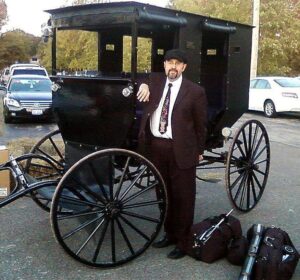
Alan Douglass. Yiddishe Cup gig, 2011.
Something funky? Alan did “Will It Go Round in Circles.” He told me to add a C harp, crossed position.
I didn’t know it was a memory loss unit. It only dawned on me a couple tunes in; there was absolutely no applause, except one aide clapped for “My Girl.” Usually people will clap for everything even if it’s bad.
A couple people sang along to “Tumbalalaika.” Bobbie was the most enthusiastic. She got up frequently, but the aide told her to sit. Bobbie was shaky. So were Alan and I. We did shaky tunes. It’s enervating playing for people who don’t respond much. But who knows, maybe they did respond deep-down. And don’t forget, “Tumbalalaika” kind of hit.
(Bobbie a pseudonym.)
—
Here’s an essay I had in the Cleveland Plain Dealer last Wednesday:
I Like Refrigerators
CLEVELAND HEIGHTS, Ohio — The plumbing-supply rep tried to sell me water-savings toilets. And another guy tried to sell me small refrigerators (less than 12 cubic feet) to fit in tiny apartment kitchens. There was a door-buzzer salesperson, too. This was downtown at a trade show for landlords. My wife had encouraged me to go. She had said, “You’ll have fun.”
I didn’t have fun, but it wasn’t painful. I ran into some fellow landlords I hadn’t seen much of. Landlords don’t meet up at the office; we’re out looking for late rent payers and plumbers who will actually show up. There were a lot of middle-class guys in sweaters and slacks. Some had on work boots. They probably owned duplex houses. Many of the landlords were mom-and-pop, owning a few buildings, like me. Some landlords wore bomber jackets and T-shirts. They were the big-time operators.
One landlord said he owned 900 units and “a dumpy shopping center in Amherst. You want to buy it?”
“No thanks,” I said.
He also said he owned five or six other shopping centers. Landlords will tell you what they own, as well as what they used to own. The bigger the number, the better. Lou owned doubles in Cleveland Heights and said he wouldn’t mind selling some. John managed and owned apartment buildings in Lakewood. I said to him, “I haven’t been to a trade show in years.” “You haven’t missed much,” John said. But I had missed him – slightly. And I had missed refrigerators.
I like refrigerators, in real life and in brochures. Refrigerators don’t often screw up, and you can occasionally get a few beers and pops from a refrigerator after a tenant moves out. Definitely some half-open ketchup.
Hotpoint is the value brand of General Electric Appliances / Haier. A Hotpoint refrigerator can last 20 years. That’s what you want in a refrigerator: 15-to-20 years. I once bought a refrigerator made in Spain. It was a Welbilt. The spelling said it all. It was good for only nine years. Now I buy appliances from a small-time distributor out of Stow. I could go with Lowe’s or Home Depot, but Josh — my refrigerator man in Stow – is very reachable and friendly. He even quotes Bible verses in his invoices.
I attended my first trade show, back in the 1970s, with my dad. He would ramble on about radiator valves and radiator air vents. He had started the family investment-property business. I said to him: “I wouldn’t mind being the next Cannonball Adderley.” I was in my 20s.
“Are you pulling my leg, son? Tell me, so I won’t get mad!”
I was half-pulling his leg. I liked to upset him — not drive him crazy, just rile him.
My dad said, “The arts are one big ego trip.”
That was a flesh wound. All quiet on the father-son front. I had played alto sax in the college jazz band.
My dad insisted I go to a landlord association get-together at the Theatrical Grill on Vincent Avenue, aka Short Vincent. This was the mid-1970s. My father and I met garbage haulers, real estate brokers, boiler guys and bankers. I heard jazz wafting into the dining room from the piano bar. Instrumental jazz was the background track for random dinnertime conversation about real estate. The big question — directed mostly at my dad — was: “You buying?” (Buying buildings? Compactors? Flushmates?)
My dad said, “Depends on the kid.” That meant me.
Now, to this day, I carry water-saving showerheads. You never know when a tenant might rip out a water-saving showerhead and replace it with an Old Faithful, water-guzzling gusher. (I pay for the water at my buildings.)
And I still play the sax (and clarinet). That doesn’t pay the rent.
Bert Stratton, a frequent contributor, lives in Cleveland Heights and has also written for The Wall Street Journal and New York Times. He writes the blog “Klezmer Guy: Real Music & Real Estate.”
April 16, 2024 No Comments
THE ARTS: MUSIC, LIT, VISUAL
Musicians probably get more ego satisfaction in one night than most people get in a year. When I don’t have a gig, I mope around the house like a guy in rehab. Where are my gigs? My cigs? My booze? Where’s my heroin? Do I want to see a movie? No, I don’t.
 Music is a different than than writing and painting; music is the laying on o’ hands. Have you tried laying on o’ hands with writing or painting? You’re in a room by yourself. That’s called solitary confinement.
Music is a different than than writing and painting; music is the laying on o’ hands. Have you tried laying on o’ hands with writing or painting? You’re in a room by yourself. That’s called solitary confinement.
Street festivals, parties, simchas, nursing-home soirees, concerts — all feel-good situations. Humans like hubbub. Noise is life. Deaf people like music; they like the vibrations.
In writing and painting, it’s a shush scene. America needs about 100 decent novelists and 100 painters. There is no minor league for writers and painters (except academia). Musicians — they’re playing in every city.
I’m in the Ohio Musicians League. That’s a minor league operation, but still, satisfying.
April 9, 2024 1 Comment
ERIC CARMEN
Pop-rocker Eric Carmen graduated a year ahead of me at Brush High in Lyndhurst, Ohio. He was the leader of The Raspberries (post-high school). Here’s why I didn’t know Eric:
- I was a tennis guy in high school, not a music guy.
- Carmen lived in Lyndhurst — super-goy land. I lived in South Euclid. I knew a handful of kids from Lyndhurst. My friend Ron, who grew up in Lyndhurst, said it was no picnic being a Jew in Lyndhurst in the 1960s.
Carmen was Jewish. Carmen, the name –vaguely Italian. Lyndhurst was vaguely Italian, too. This, just in: carmen is Latin for song. [Thanks to Ted Stratton for the Latin lore.] Eric Carmen attended a Jesuit college, John Carroll University. Strange.
There’s a Facebook page called “I Grew Up in South Euclid/Lyndhurst Club,” which saw a lot of action when Carmen died last month. Nobody on the FB page talked about where Eric Carmen went to temple. I bet he went nowhere. Maybe Eric was “unaffiliated,” as the Jewish-continuity surveyors say. Some press obits said Carmen was the son of Russian Jewish immigrants. The New York Times wrote: “[Carmen was] from a family of Jewish immigrants from Russia.” Yeah, so am I. So is nearly every Jew in Cleveland. Enough with the Jewish stuff. Or not . . .
Carmen’s grandfather was Hector Camingkovich, according to Findagrave.com. The Cleveland Jewish News, 20 years ago, mentioned that Carmen’s father worked at Gould Ocean Systems, and his name was Elmer Carmen. Eric’s mother was Ruth (nee Berns). Do the names Elmer and Ruth sound immigrant to you? They shouldn’t. A 2007 CJN obit said Elmer “enjoyed golf and travel, and was a graduate of Glenville High School and Western Reserve University.” Elmer wound up in a gentile cemetery.
Eric Carmen played sock hops at Brush High. I didn’t cotton to sock hops. (I liked bowling and miniature golf.) Alan Douglass, from Yiddishe Cup, saw Carmen a couple times. I’ll ask Alan about that.
Several commenters on the South Euclid/Lyndhurst FB site segued into naming other well-known Brush grads. For example, there was Steve Stone, a Major League pitcher who won the Cy Young Award while playing for the White Sox, or was it the Cubs? (I gotta look that up . . . Orioles.) Stone’s sister was in my homeroom. Does that count for anything? It better, because I’m sorry I (Brush’68) have no Eric Carmen reminiscences for you. (**please see addendum, under photo)
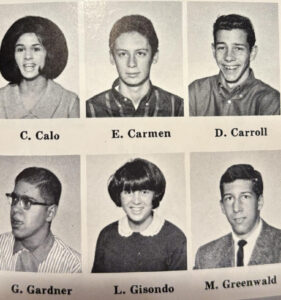
Brush High yearbook, 1966. Carmen’s junior year. (Photo courtesy of Ken Goldberg)
** Alan Douglass, of Yiddishe Cup, ran into Carmen many times at a convenience store in Mayfield Heights in the early 1980s. Alan worked there; Carmen shopped there. Alan said, “He was a ‘has been’ at that point — pre-Top Gun.” Alan had a 45 rpm record of “All By Myself,” which he brought to work for Carmen to sign, but for some reason, the “All By Myself” record and Carmen were never in the store at the same time. Alan said, “I liked everything by The Raspberries and all his solo stuff. He was power pop before there was power pop.”
April 3, 2024 2 Comments
MUSHROOMHEAD HEAD
I give musician-tenants a little slack. One musician — he specialized in electronic music, and when he moved out didn’t leave a forwarding address. I wrote “please forward” on his security-deposit refund envelope. I sent it about two months after he moved. Some tenants plain forget to claim their deposits. (About 1 tenant in 200.) I never got a thank you from the guy. He should have sent a thank-you.
I once rented to a blues guy who didn’t pay a couple months’ rent. He should have known that a 12-month lease means 12 months, not six months. Youngsters (22-to-30 year olds) — they don’t know what 12 months means, but the blues guy was over 30. Young people — they try to weasel out of their leases. They say they need to move back home to help Grandpa, who broke his hip. They need to help Grandpa drink his beer and watch The Three Stooges! That’s the real story.
Musicians are sensitive to noise; I get that. If they want to move out, I sometimes let them out early. (I once lived in an apartment building and barely survived.) Several years ago I rented to a musician in the heavy-metal band Mushroomhead. I thought he might wreck the place. No, he was clean, stayed a couple years, and was never a problem. He left behind some band merch or band paraphernalia (not sure which) for the next tenant, who was a Mushroomhead head. That worked out well. The Mushroomhead head is still a tenant.

Mushroomhead
March 27, 2024 3 Comments
YIDD LORE
Yiddishe Cup got its first paying gig in 1988, at the old Jewish Community Center on Mayfield Road in Cleveland Heights. After that, we started playing Booksellers at the Pavilion Mall in Beachwood. We did well at Booksellers. So well, in fact, the store manager kicked us out. He said, “We sometimes don’t ask back popular groups. The books are the main attraction, not the music.”
I didn’t grasp that; we were drawing a crowd of book-buying Jews. But the manager booted us. He said book browsers were dancing in the aisles, knocking down books. I suggested he put the band in the mall’s atrium. He did that once. Then he re-booted us.
Yiddishe Cup got in a book, not just a bookstore — Merging Traditions, Jewish Life in Cleveland, a coffee table book (2002). The book has a photo of the band leading a Torah procession up Taylor Road to a new shul. In the book’s index, “Yiddishe Cup” is next to “Yiddishe Stimme” (a newspaper) and Young Israel (a synagogue).
I hope Booksellers — the long-defunct bookstore — gets in a history book, because Booksellers was one of the first mall bookstores to have a café and live music. This was in the mid-1980s. It was unusual back then to walk into a mall bookstore and get a muffin and music. I remember the store was written up on the front page of the Wall Street Journal in the quirky column.

Alan Douglass (L) and Bert Stratton. 2022. (Photo by Lloyd Wolf)
There are two original members, still, in Yiddishe Cup: Alan Douglass (keys, vocals) and me. We’ve seen it all. Wait, here’s something we hadn’t seen until last month. Alan and I — and the rest of the band — played a Yekkie Orthodox Jewish wedding in Beachwood. Yekkie is Yiddish for “German Jew.” The groom’s family was originally from Frankfurt. The Yekkies held two back-to-back wedding ceremonies. The first was a German ceremony, called chuppa main. Then an hour later, we did the standard-issue OJ (Orthodox Jewish) ceremony. Even the OJ caterer said he had never seen a Yekkie doubleheader before. Also, there were no shouts of “mazel tov” after the smashing of the glass. The cantor sang Psalm 128 after the glass-smash, at which point the Yekkies shouted “mazel tov,” and we escorted the bride and groom out.
Booksellers, again . . . The Kleveland Klezmorim played Booksellers before Yiddishe Cup did. The Kleveland Klezmorim pioneered klez-jazz fusion. The Kleveland Klezmorim were in founded in 1983 by marimba player Greg Selker. The Kleveland Klezmorim wouldn’t play “Hava Nagilah.” We would, so we got a lot of their gigs. The Kleveland Klezmorim disbanded in 1990. (Footnote: Alan Douglass was a founding member of the Kleveland Klezmorim.)
Yiddishe Cup’s next free, public gig is Purim at Park Synagogue, Pepper Pipes, Ohio, this Sat. (March 23). 7:45 pm. Still kickin’ out the jams.
March 20, 2024 1 Comment
ON THE SCENE (1975)
I auditioned for a soul band at East 91 Street and Union Avenue. I had on red Adidas tennis shoes. The bandleader, Amos, liked the colors: the red shoes and my white skin. He said, “Ain’t no Holiday Inn going to hire no band without a white guy, and right now there ain’t nary a grain of salt in this room.”
I wasn’t too good on sax but I could play harmonica. Amos was intrigued by the harp; he considered the harmonica “country” — not a respectable axe for a black man but OK for a white guy. He said, “We can use that harp. You hip to Tower of Power? They got a bad white dude on harp. You hip to War? Another bad brother of yours on harp.”
The keyboard player had doubts, not about me so much, but about pot. He was exasperated by Amos’ marijuana smoking. The keyboard guy had qualms about playing in bars where customers might be high on marijuana. “Weed is communicating with the demon,” he said.
Amos said, “What you think? What you going to do when we play cabarets and shit? It ain’t no motherfucking church!”
“I quit,” the keyboardist said.
Things fell apart. Amos’ young son sat in on drums the next rehearsal, and then we had a mediocre female drummer. A horn player – an old guy (about 40) – had no teeth. He said, “Man, I can’t play without my choppers.”
Amos said we should move in a different direction: “gutbucket blues” or “even country western.” (I didn’t bring up klezmer because I hadn’t heard of it in 1975.) Amos said, “I’m unemployed! I’ll try anything.”
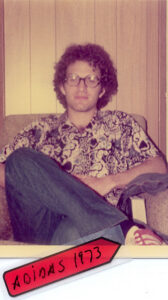 One night I stopped by the Hibachi Lounge at Union Avenue and East 103 Street. That venue was supposed to be our first gig. The Hibachi bouncer, wearing a red jumpsuit and red wide-brim hat, hung out at the pay phone, talking and shuckling (davening) like he was listening to Dial-A-Jewish-Concept. Several women line-danced to disco music from the jukebox. A couple women stared at me. Was it my red tennis shoes?
One night I stopped by the Hibachi Lounge at Union Avenue and East 103 Street. That venue was supposed to be our first gig. The Hibachi bouncer, wearing a red jumpsuit and red wide-brim hat, hung out at the pay phone, talking and shuckling (davening) like he was listening to Dial-A-Jewish-Concept. Several women line-danced to disco music from the jukebox. A couple women stared at me. Was it my red tennis shoes?
We never did play a gig.
March 13, 2024 1 Comment
MY MOTHER
I was at the cemetery the other day. I like the place. Someday I’ll be 20 feet from stardom — my mom’s plot. I have a burial plot 20 feet away. I’m a mama’s boy. Julia Zalk Stratton, my mother, died 20 years ago (March 11, 2004).
I never left Cleveland, because of my mom. It’s not that I didn’t try to leave, but I never found a better situation, geographically or psychologically. Some college buddies — hippie-types — wouldn’t even go home for school breaks; they didn’t want to appear middle-class even for a weekend. They would head to Boston or go into the woods. I went home.
When my mother died at 83, her sister told me not to grieve too much. Aunt Celeste said my mother would prefer I act upbeat. Hah.
My mother requested somebody (turned out to be my brother-in-law) read aloud a college essay of mine at her funeral . . .
In memory of my mother, on the 20th anniversary of her death. [This essay was written by a college boy in 1971.]
My mother . . .
She gave me ginger ale when I was sick, and even played catch with me once on the sidewalk. She greeted me all the time with the same happy “Hello, Alberto,” even when she, herself, was sick.
My mother sang in the mothers’ chorus when I was in elementary school, was a room mother with orange drink, and was a den mother. My mother went to see me every time I had a part in the school play, a solo in the schools, or a tennis match, even though I’d often tell her to stay away from the tennis matches. Spectators made me nervous. For big matches, she’d drive me to the courts and come get me when it was all over.
My mother told me to keep my room straight. She told me to be happy. She told me to go to medical school.
My mother came up from the South and found Cleveland to be her real home, with delis and streetcars. My mother was beautiful in her 1940s long black hair. My mother wheeled me in a baby carriage through Cleveland streets when I was one year old before we moved to South Euclid.
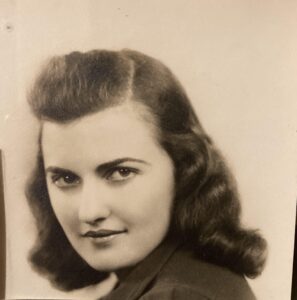
Julia, circa 1941, age 21.
My mother read a book in a second and forgot it the next. My mother baked castle birthday cakes and ship birthday cakes, looking up cake designs in cake books, like she looked up sweater patterns in sweater books. In our front room, she measured my sleeve for a new sweater, knitted in December.
My mother always told me to do my best and have a good time. In second grade she told me to “mind my manners,” and I’d had a lousy time at Doug Cormack’s birthday party, so it was then she switched to “have a good time.”
As I write this, my mother is in South Euclid, and I’m in Ann Arbor, and my sister, Leslie, is in Columbus with her husband and baby. The family is tied together by my mother.
My mother still plays tennis nearly every day. She plays bridge. She goes to Sisterhood meetings. She doesn’t let up for a second. She sweeps the carpet all the time. She’s always picking up — me and everybody else.
March 6, 2024 6 Comments
CLEVELAND, CLARINET, COMEDY
In Mickey Katz’s autobiography, Papa, Play For Me, Katz tells some off-color jokes, like “Tailor, I have a problem. I have five penises. Will the pants fit?” The tailor says, “Like a glove.” Then Katz name drops: “I was part of a regular bridge game consisting of George Burns, Dave Siegel, George Raft, and myself. Occasionally Chico Marx.”
Katz kvells about his “creative wife” Grace, and sons Joel and Ron.
Fine, but the best stuff in the book is about Cleveland. Katz mentions many Cleveland landmarks. The first half of the book — before Katz moved to L.A. in 1946 — reads like an unofficial Jewish Encyclopedia of Cleveland. For instance, Katz mentions a musician who went to an East 105 Street bagel shop at 1 a.m. in 1935 and demanded a half-dozen fresh bagels, which he ate next door at Solomon’s deli (along with a corned beef sandwich) because Solomon’s was out of bagels. That’s detail.
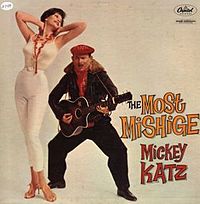
Mickey Katz 1959
In 1977, when the book came out, Katz was somewhat famous because his son Joel Grey was huge in Cabaret then. The first line in the book has the words “my son Joel Grey.” (The ghost writer of Katz’s autobio is Hannibal Coons, who was the main writer for the Addams Family.)
A couple decades ago, I took some Katz Yinglish (Yiddish-English) lyrics to a Workmen’s Circle meeting for translation. The translators – generally elderly Yiddishist purists — considered Katz shund (literary trash). Songs like “K’nock Around the Clock” and “Nudnik the Flying Shisl” (Pest the Flying Saucer) were beyond the pale.
I once lectured on Katz at the International Association of Yiddish Clubs convention in Cleveland (2007), and I met two musicians who had worked with him: cantor Hale Porter and singer Tanja Solnik. They had appeared with Katz in Hello Solly, a 1960s off-Broadway show. I asked them what Mickey had been like because I couldn’t tell from the autobio. I didn’t get a good answer from Tanja because she had been only 8 when she performed with Katz. She had been “Little Tanja.” Hale Porter didn’t say much memorable either. But it was interesting — at least for me — to simply meet people who had giggled with Mickele.
Myron “Mickey” Katz (1909 – 1985): Clevelander, clarinetist, comedian.
Katz writes about playing clarinet on the Goodtime, the Lake Erie cruise boat. (I’ve been on the Goodtime, and so has every other Clevelander.) The Goodtime was owned by the Seeandbee line. The “See” is for “Cleveland” and the “bee” is for “Buffalo.” Does that interest you?
February 28, 2024 No Comments
FLOOR AND MORE
FLOOR
I rented to a yoga lady. I went halves with her on a laminate floor for her storefront. She did the legwork, hired the installer, and sent me a bill. I expected a copy of the installer’s invoice, but I got the yoga woman’s note as to what I owed.
I did a Reagan trust-but-verify; I called the floor installers, whom I knew from way back. They had rented a store from me down the street. I hadn’t talked to them since they had moved out. The flooring woman said the numbers on the invoice were right, and she told me her husband had died of cancer at 54 in 2008. I said, “I can still picture you and Rick walking around the [flooring] store with sweaters on, freezing.” The store was on the end of the heating line and didn’t warm up too quickly.
The flooring woman mentioned my father, whom she remembered and had a good impression of. That always gets me –when people remember my dad. Not too many people do; he died in 1986. My dad had had a real affinity for young entrepreneurs: flower shop guys, flooring stores, beauty parlor owners, resale shops, bars, you name it.
—
I had an essay in the Cleveland Plain Dealer on Feb. 16. The story might have been paywalled. Here’s the whole thing:
SHY NO MORE
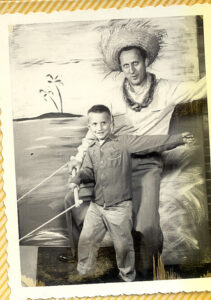
Bert and Toby Stratton, 1957, Victory Park School, South Euclid, Ohio
CLEVELAND HEIGHTS, Ohio — My family used to be shy. Then, in the 1950s, my father enrolled in a Dale Carnegie course on public speaking and became less shy. When I was in my 20s, my father bought me Carnegie’s book, “How to Win Friends and Influence People,” and I became less shy, too. When my children grew up, I bought them the book. Carnegie’s book, written in 1936, holds up. Carnegie’s message is, essentially, it’s not about you. He wrote “arouse in the other person an eager want.” Let the other person talk her head off, and you listen. Warren Buffet displayed his Carnegie-course diploma on his office wall.
Harvard psychologist Jerome Kagan wrote that shyness is partially inherited. There is a brain marker for shyness. However, if you are willing to work on shyness, you can become less shy.
I’m an extrovert now in my old age. When I play clarinet at nursing homes, the audience members occasionally heckle me, and I welcome that. I actually relish it. One listener blurted out, “Shut up and play!” And I kept on talking – bantering about whatever seemed amusing. I typically poll the audience about their lives and tell anecdotes between songs. I like all kinds of interactions, short of violence.
I ask the nursing-home residents what high schools they attended, and which delis they like. Corky & Lenny’s and Jack’s Deli finished in a dead-heat for first. Then Corky’s went under. Now the residents and I try to create lists of defunct Jewish delis: Budin’s, Seiger’s, Solomon’s, Irv’s, Lefton’s, Sand’s and Diamond’s. Are there others? As for where everybody went to high school, Cleveland Heights High comes in first. (It used to be Glenville High. I play mostly Jewish nursing homes.)
My dad, toward the end of his life, became fearless and often sent back tepid soup at restaurants, and he once told floor sanders to re-sand floors that came out too wavy. (My dad owned Lakewood apartment buildings with wood-plank floors.) The sanders were off-duty policemen, and my dad wouldn’t pay until those floors were smooth. I was impressed my dad would go head-to-head with cops. The height of my dad’s boldness was when he was in the Cleveland Clinic dying of leukemia. He told the doctor, “I own this place.” My father owned a $10,000 Cleveland Clinic municipal bond.
A hardware-store owner in Lakewood once said to me, “Nobody is going to jew me down on that price.” This was in the 1970s, and I was in my 20s and very shy. I spent several minutes pacing the store’s aisles before reapproaching the owner. I said, “Bob, you know, I’m Jewish.” Bob didn’t know that. He didn’t know “jew” was derogatory. He apologized. No big deal, in hindsight.
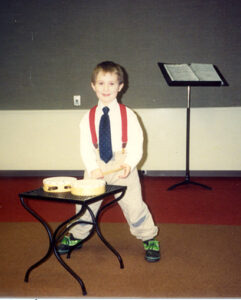
Jack Stratton on his first gig, age 3 1/2, Beachwood Library, 1991
When my youngest child, a musician, finished college, he moved to California to try to make it in the music business. I told him to call Joe McDonald of Country Joe and the Fish. I had gotten Joe’s number from a friend. Joe lived in California. My son said, “Who’s Country Joe?” Huh? Had my son never heard of Woodstock? Or at least seen the movie. I said, “Don’t be shy. Call him.” I was talking to myself mostly – my younger self.
My son didn’t call Country Joe. It takes time to become less shy.
Bert Stratton, a frequent contributor, lives in Cleveland Heights and has also written for The Wall Street Journal and New York Times. He writes the blog “Klezmer Guy: Real Music & Real Estate.”
February 21, 2024 1 Comment
HE PLAYED “OUTSIDE”
A Cleveland friend, Alan Sherwin, started an avant garde jazz band, which I followed around. Me and about two other people. This was in 1975. The band had zero commercial success; however, one musician ultimately wound up in Tin Huey — a big deal in northeastern Ohio — and another guy, a some-time drummer, wound up in Devo.
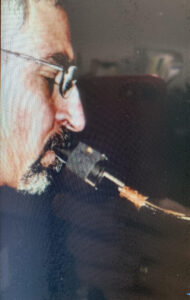
Alan Sherwin, circa 2020
Alan’s band was called Jazz Death. “Jazz Death?”– with a question mark — was the name of a jazz tune written by trumpeter Lester Bowie of the Art Ensemble of Chicago. One couldn’t get more “outside” than Bowie and the Art Ensemble. (“Outside” means playing outside the traditional chord structure.)
Alan outlined Jazz Death’s M.O. to me: “Everybody plays at once but we don’t get in each other’s way.” Besides the Art Ensemble of Chicago and other avant garde groups, Alan also liked bebop: Parker, Monk, Bud Powell. We’re not talking smooth jazz here.
Alan was an electronics teacher at my alma mater, Brush High School. He was pretty much self-taught on sax. He majored in something non-music-y at Miami University of Ohio. He didn’t care what others thought of his musical tastes. He said to me, “I don’t need Downbeat to tell me who to listen to.” He didn’t care who was playing at Slug’s.
Alan was intrigued by my career path. He said I was on “an old Jew trip” because I was going into real estate. No selling out for Alan! He wouldn’t even listen to music while he drove. He needed to sit alone in his apartment and focus hard on the tunes. (He did install a cassette player in my car. He knew electronics.)
Alan eventually moved to Washington, D.C., for a girlfriend, and I didn’t see him for years after that. I looked him up in 2012. Alan told me to learn some jazz licks — “you only need to do it in four keys” — and I’d be decent. Four keys beat 12 keys, but still, I stuck to klezmer for the most part.
A few years ago I sent Alan a comic strip by Harvey Pekar that acknowledged the late, not-lauded Jazz Death. Alan wrote me back, “What is Pekar smoking?” (Pekar was dead but that’s beside the point. The point: Alan was being self-deprecating.) Alan had become more mainstream — less Art Ensemble of Chicago, more Duke Ellington. No more going “outside.”
This link here and this one are all I can find on Alan’s music on the internet.
Wait, I’ll check Spotify . . .
Nothing. Just “Allan Sherman.”
February 14, 2024 2 Comments
JAMMIN’ WITH SOME SALMON
“Struttin’ with Some Barbecue” by Lil Hardin Armstrong is probably the best song title. It has action, smell and humor. The worst song title is “Rise Up to New Jewish Music.” Some Jewish bands go for that sort of thing. (Anything “New” is old.)
The worst name of a klezmer band is the Klezmer Conservatory Band, They are a good band but a bad name. “Yiddishe Cup,” the name, gets the job done around town, but doesn’t land us any concerts at cool, mohel’s-edge music festivals. “Yiddishe Cup” is bubbe’s procus (stuffed cabbage). Very soggy.
I once changed the band’s name to Funk A Deli but that only confused people. Every Purim, a synagogue scheduler emailed and ask what the band’s name was going to be for that year.
Last month, when I was on vacation in Mexico, I was jamming on the street (which I often do on vacations to meet people), and I was playing “Misty,” when an American couple asked me if I knew any klezmer. I said, “So happens I do!” The couple was from Madison, Wisconsin, and had hired Yid Vicious for their wedding. I’ve always liked “Yid Vicious,” the name.
Speaking of which, I was playing a gig recently at a nursing home, Menorah Park, where the fairly new activities director came up to me and said, “Do you know any Jewish songs?”
I said, “Do you know who you’re talking to!” She didn’t. She explained that the new owners of the nursing home requested all musicians play at least “4 to 6 Jewish songs.” I said, “We can play 999 Jewish tunes if you want.”
Yiddishe Cup’s last CD, Klezmer Guy, 2009, was almost called Jammin’ With Some Salmon. I test-drove that title, and nobody understood it. “Nobody,” meaning my wife, Alice. I didn’t run the title by anybody else. I didn’t want the aggravation of multiple artistic input. I wasn’t running a democracy. I settled on Klezmer Guy and started this blog, Klezmer Guy: Real Music & Real Estate, to promote the album.
–Bert Struttin
P.S. To purchase a Klezmer Guy CD, contact Alan Douglass. He has a few cartons in his basement.
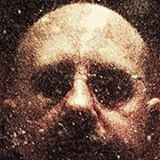
Alan Douglass (above) has cornered the market on “Klezmer Guy” CDs
February 7, 2024 4 Comments
THE ENVY CLINIC
I envy you. Don’t gloat over that. I envy a lot of people. For instance, I envy the patients at the Cleveland Clinic. They are among the 1,700 sickest people in the world. The Clinic is the 4th-best hospital in the country, according to US News & World Report. I envy that #4 ranking.
I wore a white lab coat to the Cleveland Clinic and walked the halls . . .
Desk H-70, Pain Management. The patients there don’t know about real pain. My car has static at 91.5 FM, the jazz station. That is pain.
G-50 Dermatology. The doc took full-body naked pics of me. She’s sick.
C-20, Palliative Care. People are dying but look pretty good. I take drugs and don’t look as good as these folks.
I-20, Eye Clinic. Floaters to my left, floaters to my right. I told the gate attendant at the eye-clinic parking lot, “You’ve got the most dangerous job in the world because half the people coming out of here are blind.”
He said, “Don’t you know it. This is the third time we’ve fixed the turnstile this month.”
I envy that man — the car crashes he must see.
NV-50, Envy Clinic. I’m here for a month.

[fiction]
January 31, 2024 1 Comment
MORE BOCA
In the winter, Cleveland Jews retreated to gated landsmanshaft (hometown association) condo developments in Florida to kvetch about the New Yorkers who had cut them off in the deli line earlier that day
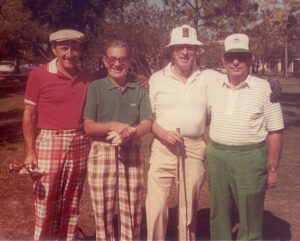
Toby Stratton, far left, 1983, Boca. (age 66)
Boca Lago (where my parents lived) was reunion central for alums from John Adams High and Glenville High in Cleveland. My parents wouldn’t play golf with anybody they hadn’t gone to grade school with. Exception: Detroit people were OK. (Detroiters had their own deli, the Detroiter, featuring Motown hot dogs and Vernor’s.) Other acceptable landslayt (countrymen) were Jews from Columbus, Cincinnati, Dayton and Pittsburgh. Those people were OK. They wouldn’t say, “I’m on line. Get behind me!” (Although they might say, “I’m in line. Get behind me!”)
My dad owned a Florida deli. (Actually, he was the deli’s landlord.) Toby owned a shopping strip center in Sunrise, Florida, that had a tenant Tam Tov Deli. The parking lot was always jammed. Cars of old Jews smashed regularly. Above the deli, there was office space, mostly vacant. My dad lost a lot on that building.
My dad liked deli food. I’ve written enough on that subject, but for the record, halvah was a big thing with Toby and doesn’t get enough play in this blog.
Glades Road, Boca Raton, had a Bagel Nosh, which was not up to standards. I told my dad,”We have that in Cleveland and it’s crap.” He agreed.
January 24, 2024 3 Comments
WEATHER KVETCHERS
I employed a building manager who loved the Weather Channel and thought the end of the world was coming daily via tornados or snowstorms. I don’t think she ever went outside in the winter. She said winter was too gray for her.
Bad weather is no excuse for a bad attitude. If you don’t like gray, move or get a sun lamp. More gets accomplished in gray weather. The Scots and New Englanders didn’t invent stuff sitting at the beach.
Another employee was fixated on the weather, too. He did a lot of interior apartment painting and wanted it to be 74 degrees, like Costa Rica, so he wouldn’t sweat.
My parents had a condo in Florida. So did my in-laws. In fact, my folks and Alice’s parents lived in the same development (Boca Lago, Boca Raton) and got along better than Alice and I.
I’m not a Florida fan. Too hot. I know a klezmer musician — a bushy-haired baby-boomer — who moved to Florida and took up golf. Maybe he played a freylekhs (hora) by the water fountain on the 16th hole at Boca Lago. (Mickey Katz did that, although not at Boca Lago. His band got paid to surprise a golfer on his birthday at a golf course somewhere.)
Arizona versus Florida – that’s the question here in Cleveland in the winter. Alice and I went to a wedding in Florida, where a guest asked us, “Are you still in Cleveland?” That meant: “Are you nuts? Do you like snow, gray skies, slush and potholes?” Don’t mind those things. I went walking yesterday in very cold weather. As they say, there’s no bad weather, just bad clothes. I think a Scandinavian said that.

Lake Erie
Another Cleveland woman at that Florida wedding said, “The day I hit 62, I had to leave Cleveland.” She now spends her winters in Scottsdale. A third Clevelander — originally from South Africa — said she preferred Florida over Arizona because of the water. “I like the ocean,” she said.
Lake Erie is the “ocean.” Look it up. Cleveland is doable.
One last word: layers.
—
Here’s my op-ed from the 1/11/24 Wall Street Journal. (No paywall) “Wait a Minute, Mr. Postman.”
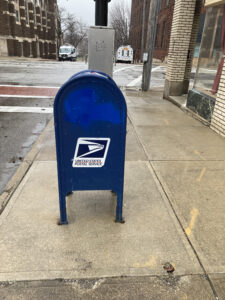
a blue-ish mailbox
P.S. re: mailbox story . . . Yesterday I got a FedEx gift of a carton (12 cans) of USPS spray paint from a mole deep in a paint factory. The mole’s note read, “Always paint with the correct color.” (If you need a can of Postal Blue, let me know. But I don’t ship.)
Please read my WSJ article if this is all Greek to you.

The real stuff
January 17, 2024 3 Comments
SKI CAP BIZ
If you’re going to lose something, lose a ski cap. When I lost my ski cap, I retraced my steps along Taylor Road. I figured nobody would pick up a used ski cap. But some jerk did! The cap was gone. Coincidentally, my wife had lost a ski cap the day before.
I like a cap that isn’t too snug.
I always have a couple ski caps in storage. I need various weight caps. I reinspect my inventory every December for the impending winter. I like a ski cap with some color in it in case I drop it.
Discount Drug Mart has good ski caps for $2 each.
If this post is too Larry David, so be it. The guy is always ripping me off.
Stay warm.

(Illustration by Ralph Solonitz)
January 10, 2024 3 Comments
A SENSITIVE GUY
Charlie Chaplin brings tears to my eyes. And I adore ’Trane and Beethoven. T.S. Eliot — yeah, I know he wasn’t thrilled about Jews, but who can deny him and his line “Humankind cannot bear too much reality.”
Yes, reality “blows” — as we used to say in junior high. For instance, I need to check with a welder right now. He’s supposed to pick up some ribbon sheets for a fire-escape repair job. That certainly blows. Fire escapes — they need to be painted almost every year in Cleveland, or they rust out. Don’t put salt on fire escapes. Calcium chloride is OK, but no salt.
I once was vainer, younger, shallower and more facetious. Now I’m all that, and older. I wake up, eat a bowl of prunes, brush my teeth and think about getting elevator shoes. A couple inches might change my life.
I’m all in on the slogan “Drive away loshn hora,” which is Jewish-talk for “Don’t repeat gossip.” I’ve got to work on that.
I don’t like ferrets. Who does? I know a ferret named Bubbles. I’m going to kill him. OK, indict me. And put me in jail for this, too: Anglophilia, Jewmania and prickliness. I loved The Crown, except the last part.
Are you Jewish? I spend a couple minutes a year discussing whether Brubeck was Jewish or not. And I spend a minute a decade on whether Chaplin was Jewish. (Chaplin and Brubeck weren’t.)
Yesterday I cut off a man at Dave’s supermarket, Shaker Square, and he went ballistic. It could have been a racial thing. I was the only white guy around. Or maybe I was simply a jerk. My cart was in front of his in line, and I went to another line (sans cart) to see if the second line was shorter. When I came back, the guy went nuts. “What you doing?”
”I’m ahead of you,” I said.
“No, you ain’t!”
I wouldn’t give in. Then I did. I’m mellow. I’m interested in love, but also rubble, swine, nudniks, landlords, klezmer musicians and Snickers.
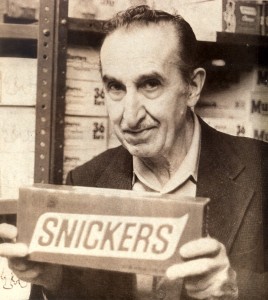
The candy man, John Lokar (1981).
I don’t take criticism well. A klezmer violinist in California called my band “crappy,” This was years ago, online. I need to to find out what part of California he lives in and do something.
A rabbi was disbarred (disrobed?) for soliciting a prostitute. I like gossip. Can’t help myself, Chabad.
I ruffle feathers. Ruffle, ruffle. People don’t like me. At least some people. I could name a couple but I don’t want to give them ink here.
I’m sensitive. Please don’t comment on any of this.
(fiction)
January 3, 2024 1 Comment
A BRIDGE IN BROOKLYN
I held a party last month in a dumpy part of New York, at a winery/bar in East Williamsburg, Brooklyn, right near a pedestrian foot bridge. The Scott Avenue pedestrian foot bridge — a steel-and-concrete structure — was built by Republic Steel, circa 1952, so that steelworkers could safely cross the Long Island Rail Road tracks to get to the then-extant mill.

The Scott Avenue foot bridge.(Photo by Mitch Waxman)
My party was a Vulfpeck pre-concert “tailgate” for friends and relatives. After the party we were going to walk en masse over the bridge from the winery/bar to the concert venue, which was in a nearby Flats-like former warehouse/factory.
I was concerned my guests wouldn’t take to the bridge. For one thing, the bridge had a lot of graffiti and there was garbage all over. I thought my sister would bail and take an Uber from the winery/bar to the concert. My sister has never been big on filth. But she and everybody else didn’t complain about the hike or the bridge! It helped that it was dark out. The litter on the bridge was less apparent. On the far side of the bridge, several Latinos were finishing up a volleyball game. Other than that, nothing.
I had read stories in the Brooklyn Paper about crime in the neighborhood of the bridge. But those stories mostly had to do with concertgoers leaving rave shows at 2 am, drunk or stoned, and getting robbed or just plain dying of overdoses.
That Scott Avenue pedestrian foot bridge held its weight.
December 27, 2023 1 Comment
DELI DEATH
My kids liked Corky’s. The blintzes, the pickles, the halvah, the phosphates. But I’m not here to write food nostalgia. Too cheesy.
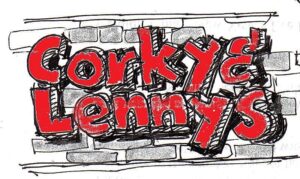
C&L’s closed, for good, Tuesday. The word in the local press — Cleveland Jewish News and the Plain Dealer — is C&L’s had a problem getting good help. That ain’t news. I’m skeptical.
My dad was a chocolate-phosphate addict. So is my daughter, Lucy, who called the phosphates “chocolate frost feets.” Cleveland musician Mickey Katz, in his autobiography, called chocolate phosphates “Jew beers.” (Katz’s son is Joel Grey.) Katz drank “Jew beers” at Solomon’s Deli on East 105th Street in Glenville.
My father, Toby, was a “deli Jew.” That’s typically a putdown in the Jewish community, meaning my father knew more about corned beef than Torah. Toby’s favorite food was a “good piece of rye bread.”
My father probably drank no more than 100 real beers his whole life. He should have! In his retirement — when he drank more — he smiled a lot more. A bit shiker at one party, Toby teed off on a watermelon fruit bowl with a golf club. The golf club was a driver, a wood. Solid.
I grew up on chocolate phosphates, just like my dad and my kids. I drank many of mine at Solomon’s in the Cedar Center shopping strip in South Euclid, where Solomon’s had moved — from East 105th Street — in the 1950s.
For some Semitic, semantic reason, goys occasionally called Cedar Center the Gaza Strip. This has nothing to do with the present war. It’s just the word strip, as in Gaza Strip and shopping strip, made for an interesting juxtaposition. The north side of Cedar Center looked pretty bad, actually. In the early 2010s it was concrete chunks and gravel heaps, until a real estate developer knocked down the 1950s-era plaza and put up a Bob Evans and other national chains.
Bob Evans is good. Not knocking it.
The C&L’s at Cedar Center lasted until 1994. A second Corky’s opened further east in 1973. That one — the “new” one — just closed. Confused? Simply put, there are no more C&L’s in Cleveland.
At Cedar Center Corky’s, a couple small tough Jews hung out in the rear booth. One was Bobby (pseudonym.) Bobby did collections for a major landlord. Major, to me, meant more than 500 units. I knew Bobby from junior high. Bobby sued my mother. Mom, for health reasons, had moved from her Beachwood apartment, where Bobby collected rents, to an assisted living facility. She had a couple months left on her lease. She had lived in the apartment 27 years. Bobby went after her. Bobby’s boss, by the way, loved my band. So what, my mother was collectable.
Delis have been going downhill for decades. In 2010 journalist David Sax wrote a book, Save the Deli, about the decline of the deli. Here’s something for your next edition, Mr. Sax; Delis went downhill when they added TVs. Why are we forced to watch sports while we eat?
I’m deli-famous. Listen to me. I once wrote a thank-you note which was posted in the entrance of Jack’s Deli on Green Road in Beachwood. My letter was about the terrific tray Jack’s had prepared for the bris of my first child, Teddy. (Jack’s Deli is still standing.) Oh yeah, my first bris as a dad . . . fatherhood was about buying huge quantities of smoked fish. In my letter I complimented Jack’s on their white fish, which my Aunt Bernice the Maven approved of. I used the expression “Aunt Bernice the Maven gives her seal of approval” in my letter. Bernice worked for a food broker and knew food.
Do you prefer Jack’s Deli or Corky & Lenny’s? I asked that question just last week at a gig. I queried a nursing-home crowd about their favorite deli. Jack’s and Corky’s ran a dead heat. After my quiz, my keyboardist and I played the song “16 Tons (of hard salami),” which is the Mickey Katz parody of Tennessee Ernie Ford’s “16 Tons” (of coal).”
Yikhes (lineage): My dad grew up in a deli on Kinsman Road. His mother had a candy store /deli at East 118th Street and Kinsman. The deli was called Seiger’s — my grandmother’s maiden name. She sold it to her half-brother, Itchy, when he came over from the Old Country. Something fishy about that deal. My grandmother went from being a candy store/deli owner to simply a candy-store owner.
I once played the “deli card” to establish my bonafides. In an odd place. I was working as a police reporter in Collinwood, and the cops at the police station on East 152nd Street considered me a Jewish hippie spy from the Heights. But when I told the cops I was a Seiger, as in “I’m from Seiger’s Restaurant, you know, on East 118th and Kinsman” — the older cops suddenly took a liking to me. The older cops—mostly high-ranking guys — knew Seiger’s Restaurant well. Seiger’s had been like a Damon Runyon casting hall; all manner of hustlers, cops, businessmen, and schnorrers had hung out there. (Seiger’s closed in 1968.) The schnorrers were Orthodox Jewish tzedakah (charity) solicitors; they had their own booth in the back. My great-aunt, Lil Seiger, served the schnorrers kosher food from her apartment, which was in back of the store, because the schnorrers wouldn’t eat the non-kosher food. The deli was kosher-style, not kosher. Cops ate well at Seiger’s, and nobody ever got a ticket for an expired meter, and sometimes cars were parked two lanes deep on the street, an old cop once told me. Itchie Seiger, my great uncle, was the restaurant’s maitre d’, a k a kibitzer (glad-handler). He was a former cloak maker from Galicia, a province in Austria-Hungary. My grandmother Anna Seiger Soltzberg was a Galitizianer, as well.
I personally didn’t see Itchie very often. My parents didn’t consider a drive from our house in South Euclid to Kinsman the right direction for a Sunday cruise. We usually wound up going east, toward the Chagrin River metro park.
My great-aunt, Lil, supposedly gave her recipe for mish mosh soup to Corky’s. All the deli owners knew each other. So I’m connected to Corky & Lenny’s. Pass the Jew beer. Slurp.
—
A lot of this post originally appeared in Belt Mag in 2014. The graphic is by Ralph Solonitz.
I had an op-ed in the Wall Street Journal last week. “Maimonides Goes Wrong.” It has the word schnorrer in it, too. Link here. No paywall.
December 12, 2023 1 Comment
SMASHED
I called Cody’s mother because he hadn’t paid his rent. Cody’s mom said, “I expected you to tell me he was dead. He’s been impossible since he was 15. I have two children. One is stellar and the other is Cody.” Cody was 27.
I knocked on Cody’s door but he wouldn’t answer. I filed on him in court. He eventually texted me, “You’re going to have to go thru eviction process while I work things out.”
I went to his apartment again. I said through the door, “I hear you’re still here. Your mother thought I was calling her to tell her you’re dead. Get it together, man.” He had no furniture and slept on the floor, surrounded by a bong and cigarette butts. I told him to call community services, which was passing out free rent money. His rental application said he was a painter with his uncle’s firm.
I had rented to Cody because, for one reason, his mom had accompanied him when he had come by to see the apartment. She and Cody put down the final month in advance.
Finally, the court evicted Cody. He was supposed to vacate within 10 days after the eviction hearing. I showed up at his door at 9 am on day 11. The chain lock was on. If you have the chain lock on, and you’re inside, I got a problem.
Later that day the chain was off. There was stuff in the apartment. I called his mom. I wondered where he had gone. It was freezing out. She said, “He may look like a druggie but he isn’t. He’s mentally ill.”
Cody’s uncle — the painting contractor — said, “I’m not sure if he’s ill or just lazy. He’s smart. He got in a couple scuffles with my guys but he was OK. I was going to help him buy a truck. He got a few paychecks to get the apartment, and then he quit. He’s not staying at my house tonight. So he messed you up with the lock — the coming and going — at the apartment? That might be breaking and entering. Maybe he’ll get a warm bed in a jail tonight.”
We stored six bags of garbage from Cody’s place for a while. That’s the state law. I asked my maintenance guy, “What about kitchen table?”
He said, “I basically stomped that and put it on the tree lawn. It’s smashed.”
Smashed.
—
“Cody” is a pseudonym. Drawing by Ralph Solonitz.

December 6, 2023 1 Comment
HERBERT GOLD
OF HATHAWAY AVENUE
I wanted to be Herbert Gold, who wrote for Playboy and other mags. He also wrote novels about growing up in Cleveland. They weren’t good novels. They were too wordy, going in circles. He couldn’t do plot. (Not too many people can.)
Gold was one of a handful of Jews who grew up in Lakewood in the 1920s and 1930s. He lived on Hathaway Avenue. He died on Nov. 19 at 99 in San Francisco. His father ran a small grocery store in Lakewood, and the father — unlike most Cleveland Jews — didn’t settle on the East Side. (Lakewood, on Cleveland’s West Side, was beyond the pale for Jews back then, and still is to some extent.)
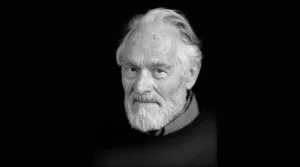
Herbert Gold. circa 2010.
I passed Gold’s house on Hathaway Avenue in the 1970s on my way to managing apartments in Lakewood. I had unpublished novels; I had a lit agent in New York. I wanted to be the “next Herbert Gold,” though slightly better. Instead, I became the “first Bert Stratton.”
The Prospect Before Us was Gold’s novel about managing a rundown hotel on Prospect Avenue in Cleveland. You’d think a book with such a good title would be good, but it never went anywhere. It wasn’t funny or tragic. Don Robertson, another local novelist, was better. Robertson could be funny, for one thing.
Gold’s memoir My Last Two Thousand Years — about his father and Herb’s relationship to Jewishness — was moving. He wrote, “My father came to America from Russia and lived in a basement on the Lower East Side. I came to America from Lakewood to live in a basement on the Lower East Side. I washed dishes, cleaned rooms, waited on tables and tried to learn a little Yiddish [1942, NYC].”
Gold moved to San Francisco in 1960 and stayed there. He visited Haiti often. I occasionally saw his brother Sid on Coventry Road in Cleveland Heights. Sid was a Coventry cowboy — a regular in Harvey Pekar’s comic books. Sid didn’t have a job and played a lot of chess.
In a 2021 interview, Gold said, “I’m very preoccupied with the fact that I’m not going to live forever. Death is inevitable and I have to accept it. I’m comforted by the fact that a few people, my children, will remember me or will inherit something from me, and I will be immortal in that sense.”
Herb Gold: a Jewish writer from Lakewood, Ohio. I gotta drive by his childhood house at 1229 Hathaway Avenue again.
—
I had an op-ed in the Wall Street Journal on Nov. 16. “My Gaza Friend is Dead.” [No paywall]
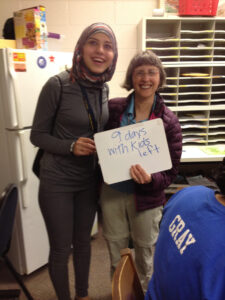
Baraa Abu Elaish (L) and Alice Stratton. Fairfax Elementary School, Cleveland Heights, Ohio. 2014.
—
On a lighter subject, here’s my essay in today’s Cleveland Plain Dealer. “Pondering signs, borders and license plates.”
—
Yiddishe Cup plays a free concert 2-3 pm this Sun. (Dec. 3) at the Beachwood Community Center, 25225 Fairmount Blvd, Beachwood, Ohio. Be there!
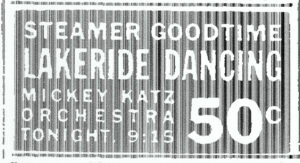
Plain Dealer ad, 6/24/36
November 29, 2023 3 Comments



